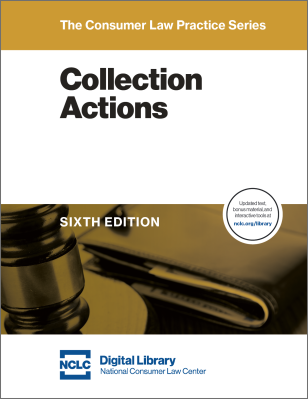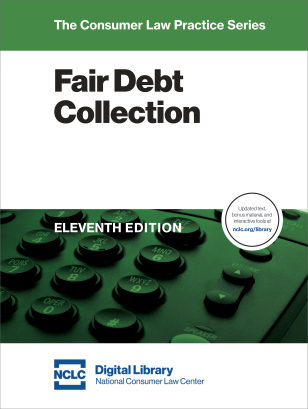Federal nursing home law prohibits nursing homes from requesting or requiring a third party, such as a resident’s family member or friend, to sign an agreement to be personally liable for a resident’s nursing home expenses. Despite these protections, nursing homes commonly use questionable admission agreements that seek to make family, friends, or other third parties liable for a resident’s nursing home debts. This can lead to nursing homes later suing family or friends for their loved ones’ bills—bills that can exceed $100,000. These third parties are pressured into paying the debts out of their own pockets to avoid loss of the resident’s desperately needed care and frequently wind up with costly default judgments against them if they fail to pay.
While the Consumer Financial Protection Bureau (CFPB) and Centers for Medicare and Medicaid Services (CMS) have attempted to address this problem in recent years, nursing homes are continuing to try to evade consumer protections, as shown by a recent report from Justice in Aging and the National Consumer Law Center. Alarmingly, the report found that 75% of survey respondents indicated they had seen nursing home admission agreements that make third parties (generally family or friends) liable for nursing home expenses.
This article explains new federal guidance from CMS confirming that these practices are illegal. The article also explains the practical implications of the new guidance, including how advocates can use the guidance to strengthen family and friends’ defenses to collection actions and support potential claims for individual and class actions against the nursing homes and attorneys who are engaging in illegal collection practices. For a more general discussion of nursing home debt and collections, see NCLC’s Collection Actions § 9.6. See also NCLC’s Defending Nursing Home Collection Lawsuits.
New Guidance Protecting Residents’ Families and Friends
Centers for Medicare and Medicaid Services (CMS) regulations already provide that nursing homes must not request a third-party guarantee as a condition of a resident’s admission or continued stay in the facility. The facility may require a third party who has legal authority and access to the resident’s funds to sign an agreement to be responsible for making payments to the home from the resident’s income or resources, if that third party does not incur personal financial liability. See 42 U.S.C. § 483.15(a)(3). Despite the clear prohibition on the imposition of personal liability in these agreements, many agreements contain conflicting terms that at first seem to comply with the law but then later seek to hold the signing party personally liable for damages for any breach of the agreement. Some agreements even contain blatant violations of the law, such as personal guarantees of payment. See the appendix to NCLC and Justice In Aging’s report for specific examples of these problematic terms and agreements.
On November 18, CMS updated its guidelines interpreting the federal regulation to clarify that various nursing home attempts to evade this provision are illegal. The new guideline was to become effective on February 24, 2025, but the effective date is now delayed until April 28, 2025. The guideline is directed to state survey agency directors, whose responsibility is to survey a sample of nursing home residents for quality of care and compliance with residents’ rights under the federal nursing home statutes. While technically directed at state survey directors in their monitoring of nursing home practices, the guidance is intended to be followed by the nursing homes themselves. The guidance can also be used by advocates defending nursing home collection actions against third parties and bringing affirmative individual or class claims against nursing homes or their attorneys and other collectors for illegal collection actions.
Nursing Home Collection Practices Now Prohibited
The CMS guidance reiterates the basic law and protections: a nursing home cannot obtain an agreement from family, friends, or other third parties to use their own funds and resources to pay for the resident’s payment obligations. While the home may require the signature of a resident’s agent (such as family or friend who has power of attorney or other legal authority to act on the resident’s behalf), the agreement can only commit the agent to paying the nursing home from the resident’s resources, and the agreement cannot require that the agent is personally liable for any expenses or damages.
Of greater significance, the new guideline provides specificity as to what language is prohibited in nursing home agreements:
- “Language that holds both (1) the resident and (2) the representative or other individual jointly responsible for any sums due to the facility …” .
- “Language that holds the representative or other third-party individual personally liable for breach of an obligation in the agreement, such as (1) failing to apply for Medicaid in a timely and complete manner or (2) allowing someone other than a signatory to the agreement to spend the resident’s resources that would be used to pay the nursing home.”
- “Language that does not specifically mention a third-party guarantee but that implies the resident could be discharged if the representative does not voluntarily agree to personally pay to prevent the discharge.”
- “Language that holds the representative or other individual personally liable for any amounts not paid to the facility in a timely manner because the representative or other individual did not provide accurate financial information or notify the facility of changes in the resident’s financial information.”
Practical Implications of the New Guidance
The surveyor’s guidelines influence surveyors, operators, and other enforcement entities. If a facility practice is identified as illegal, a state surveyor may cite a nursing home for violating the law. The new guidance also has greater practical significance. The guidance provides a valuable tool to advocates responding to nursing home collection actions filed against the resident’s family or friends. The guidance can also form the basis for an affirmative individual or class claim against the nursing home or its collection attorneys or other collectors.
One of the most common attempts to create third-party liability should now be unenforceable and illegal—use of a “responsible party” clause that seeks to hold the signing party “personally liable for breach of an obligation in the agreement.” Responsible party clauses require that a resident’s family member, guardian, conservator, or agent under a power of attorney to sign the admission agreement and attest that they have access to the resident’s funds and that they agree to help the resident secure Medicare/Medicaid coverage or use the resident’s funds to pay the resident’s bill. Any such agreement that contains language seeking to hold the signing party personally liable for any damages, including attorney fees, for their failure to comply with their obligations under the agreement is a violation of federal law. Nursing homes and collection attorneys who use these clauses to sue third parties individually based on their alleged failure to access the resident’s funds or secure Medicare/Medicaid coverage may not only be violating federal nursing home reform law, but also federal and state consumer debt collection protections.
These clauses already violate the regulation that indicates that a third party should not incur personal financial liability. See 42 U.S.C. § 483.15(a)(3). But the round-about way that these clauses operate has led some courts unfamiliar with nursing home law to uphold third-party liability based on a responsibility party clause. The clauses also offered nursing home and their collectors a colorable argument for liability, making them comfortable initiating collection contacts and lawsuits. More on responsibility clauses and current litigation under those clauses is found in NCLC’s Collection Actions § 9.6.7.2.
The new guidance should help advocates stop this abuse, making these types of clauses and agreements illegal and unenforceable. For example, the guidance prohibits “[l]anguage that holds the representative or other third-party individual personally liable for breach of an obligation in the agreement, such as (1) failing to apply for Medicaid in a timely and complete manner or (2) allowing someone other than a signatory to the agreement to spend the resident’s resources that would be used to pay the nursing home.”
Family members and friends should now be able to assist residents without fear of being sued directly for nursing home expenses. Moreover, the guidance should be a powerful basis on which to defend nursing home collection contacts and lawsuits.
Third-Party Individual and Class Affirmative Claims Against Nursing Homes and Their Collectors
When a nursing home seeks collection from third parties, the amounts in some cases can be over $100,000, so that affirmative claims even on an individual basis can be significant. In addition, nursing homes often use attorneys specializing in nursing home collections. The collection attorneys can thus be liable under the Fair Debt Collection Practices Act (FDCPA) for collecting a debt not owed. See 15 U.S.C. §§ 1692e(2), 1692f(1); NCLC’s Fair Debt Collection §§ 7.2.2, 8.3.
The nursing home itself will not be liable under the FDCPA, but it may be liable under similar theories under a state UDAP statute or state debt collection statute. See NCLC’s Fair Debt Collection §§ 16.2, 16.3.
Actual damages might include amounts collected or, where amounts have not yet been collected, for attorney fees and other expenses and damages related to responding to the collection contact. Attorney fees and statutory damages are also available under the FDCPA and a UDAP claim typically allows for attorney fees and may allow for enhanced damages.
Nursing home collections may also be a fertile area for class actions. The offending contract provisions forming the alleged basis for third-party liability are not only standard for an individual nursing home but may also be standard across a nursing home chain and even across many unaffiliated homes throughout the industry. This may allow for class actions not just against homes, but also against attorneys specializing in nursing home collections and other collectors. Attorneys interested in learning more about defensive and affirmative litigation involving abusive nursing home debt collection should connect with NCLC’s national listserv of advocates working on these cases. For more information and to sign up, visit NCLC’s listserv page on our website.




